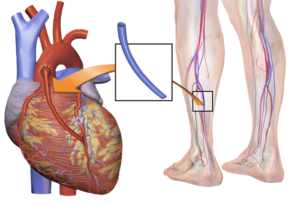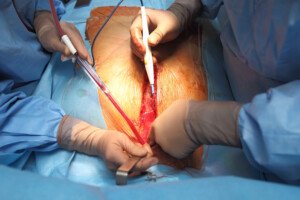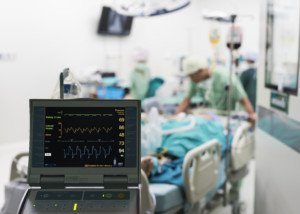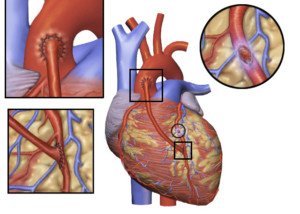
If a loved-one has coronary bypass surgery, you as the visitor may become aware of a lot of interesting things that occur post-op.
Some of these will be considered “complications,” and they may seem very alarming, when in fact, they’re not as bad as they seem.
Atrial Fibrillation
The first complication that my mother had, while in the ICU after coronary bypass surgery, was “A-fib.”
You, as the visitor, will become aware of this when the heart rate monitor starts giving off a warning beep.
The monitor should be silent otherwise, so the sudden beeping will get your attention and be scary.
Staff will rush into the room and may awaken the patient if the patient is asleep during this event.
The first time my mother went A-fib, staff cleared her gown from her chest and attached monitors. This indeed looks frightening to the onlooking family member.
You may hear a nurse contacting a doctor by phone, describing the event and asking for directives.
You may see an EKG report being churned out of a computer and staff examining it.
And you will see, on the heart rate monitor, the heart rate continuously bouncing all over the place in the high range.
You will hear the word “A-fib” more than once being spoken. You may also remember that the heart surgeon told you, pre-op, that one possible complication of coronary bypass surgery is atrial fibrillation.
And you will remember, as I did, that the surgeon said it could easily be controlled, and that the more serious complication is ventricular fibrillation (V-fib).
Nevertheless, witnessing my mother’s first A-fib was nerve racking. So was the second one.
But each subsequent one was less alarming; you will notice that staff increasingly acts more casually, and that no doctors are present: a good sign.
You’ll learn that drugs control the situation, and that sometimes, the patient will spontaneously “pop out” of A-fib and the heart rate will return to normal.
If you witness several A-fibs, you’ll become very sensitized to the heart rate monitor’s distinctive beeping.
So that when you hear the monitors of other patients start beeping, you may have a conditioned response of anxiety and your own racing heart. Over time you’ll become desensitized to the beeping.
Kidney Function
Coronary bypass surgery may affect kidney function. A kidney doctor was called in to see my mother and explained she had mild kidney failure, and that they’d be just “watching it for now.”
Coronary bypass surgery causes the kidneys to be shorted of blood, and hence, they may “fail.”
The “failure” may only be mild, and is measured by a daily creatinine test. The doctor will be on top of this to see if the number gets above a certain value.
In the meantime, treatment will include fluid restriction.
The worst case scenario impression that I got was that if the kidneys didn’t “bounce back,” my mother would need dialysis. No mention of possible kidney transplant was ever made.
Mental State
The coronary bypass patient (or other type of surgery) may be delirious or confused even several days out from surgery; a definite alteration in normal mental status.

Shutterstock/Volodymyr Baleha
My mother thought I was her other daughter, for instance. Assume that off-the-wall comments, oddball questions and bizarre observations are the results of lingering anesthesia and/or the effects of powerful painkillers.
Chest Pain
The coronary bypass patient may complain of agonizing pain, particularly in the chest.
Don’t assume the patient is having a heart attack. Instead, remind yourself that the patient was very recently cut open in the chest.

Opening the chest. Shutterstock/sfam_photo
Complaints of severe pain may also center around the belly – where tubes will be inserted.
Very Swollen Legs
The coronary bypass patient will have significant visible swelling and bruising, especially in the legs if veins were harvested from the legs for the coronary artery grafting. This isn’t pretty, but it’s normal.
The coronary bypass patient will have fluid in the lungs; this is normal and is called pulmonary edema.
Fluid in the lining of the lungs, called pleural effusion, is also normal.
Drugs called diuretics treat this post-op condition.
Coronary bypass surgery is very frightening, but extremely lifesaving.
Enough visits to the coronary bypass patient and you’ll become acquainted with different kinds of beeping sounds that hospital equipment makes.
You may then develop a conditioned response of anxiety every time you hear things in daily life beeping, like your car when the seatbelt isn’t put on.









































